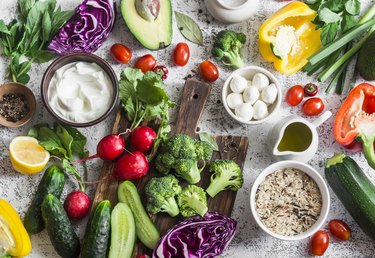
If you have high bilirubin levels, or think you might, it's best to first work with your doctor to figure out the cause. Sometimes diet changes can help. If you have liver disease, experts say to avoid processed foods and added sugar, reduce saturated fats and carbohydrates and adopt a Mediterranean diet.
Read more: Yellow Hands? Here's Why and What to Do
Video of the Day
Video of the Day
Behind the Bilirubin
When your body goes through the normal process of breaking down red blood cells, it creates a yellowish substance called bilirubin, according to the U.S. National Library of Medicine (NLM). A healthy liver helps remove most of that bilirubin, but an unhealthy one may allow bilirubin to leak into your bloodstream.
This can cause a yellowing of the skin and whites of the eyes called jaundice, according to the NLM. "There are various causes of jaundice," says Baltimore-based Tinsay Ambachew Woreta, MD, MPH, a hepatologist, transplant hepatology fellowship program director and assistant professor of medicine at Johns Hopkins University, "and whether diet makes an impact or not really depends on the underlying cause." If you're noticing the telltale signs of jaundice, it's important to talk to your doctor, because jaundice can be a sign of a serious illness.
The most common cause of jaundice is nonalcoholic fatty liver disease (NAFLD) and nonalcoholic steatohepatitis (NASH), according to Dr. Woreta. Per the NLM, jaundice can also be caused by:
- Chronic liver disease
- Liver infections from hepatitis A, B, C, D or E
- Overdose of certain medications or exposure to poisons
- Birth defects or disorders
- Gallbladder issues, like gallstones
- Blood disorders
- Pancreatic cancer
It's key to learn the cause of your high bilirubin levels. Some issues may involve diet as a part of their treatment, but others — like gallstones — may require an entirely different solution, such as surgery, according to the National Institute of Diabetes and Digestive and Kidney Diseases (NIDDK).
Pick Mediterranean Foods for High Bilirubin
Liver issues are often associated with alcohol use, but diet plays a crucial role, too. "Because people associate liver disease mainly with people who drink alcohol or have hepatitis C, they don't realize that unhealthy eating can lead to end-stage liver disease and cirrhosis," Dr. Woreta says. Cirrhosis is when scarred and damaged liver tissue begins to replace healthy liver tissue, reducing liver function, according to the NIDDK.
The best foods for high bilirubin are unprocessed foods low in saturated fat and without added sugar. Don't worry: You can still snack on bananas. Yellow foods don't cause jaundice. To prevent the progression of nonalcoholic fatty liver disease — even for people with end-stage liver disease — Dr. Woreta tells her patients to avoid processed foods and added sugar, reduce saturated fats and carbohydrates and adopt a Mediterranean diet.
According to the American Heart Association (AHA), a healthy diet typical of the Mediterranean region looks like plates full of:
- Fruits
- Vegetables
- Whole grains
- Beans
- Nuts and seeds
- Olive oil
In addition, fish and poultry are included in the diet (they tend to replace red meat), and dairy and eggs are eaten in low or moderate amounts.
You might want to lean toward a Mediterranean diet for more than just your liver's sake: It's been shown to boost brain and heart health, too, according to the AHA.
Think Before You 'Detox'
Dr. Woreta warns against the concept of doing a liver "detox" or "cleanse" after consuming a lot of alcohol or processed foods. "It's better to avoid exposing the liver to the hepatic toxins like excessive alcohol, excessive sugar and fat in the first place," she says. (Plus, your body can "detox" itself all on its own.) And if your high bilirubin is related to alcoholic liver disease, it's important to stop drinking alcohol altogether and eat a diet low in salt, according to the NLM.
Talk to your doctor if you're worried about your high bilirubin levels, jaundice or your liver. And if you want to avoid issues in the future, a healthy diet might go a long way. Eating nutritious foods, limiting portion sizes and maintaining a healthy weight are all important for preventing nonalcoholic fatty liver disease and its complications, according to the NIDDK.
- U.S. National Library of Medicine: “Bilirubin Blood Test”
- U.S. National Library of Medicine: “Jaundice”
- Tinsay Ambachew Woreta, MD, MPH, hepatologist, Transplant Hepatology Fellowship program director, assistant professor of medicine, Johns Hopkins Medicine, Baltimore, Maryland
- U.S. National Library of Medicine: “Jaundice Causes”
- National Institute of Diabetes and Digestive and Kidney Diseases: “Treatment for Gallstones”
- National Institute of Diabetes and Digestive and Kidney Diseases: “Cirrhosis”
- American Heart Association: “What Is the Mediterranean Diet?”
- U.S. National Library of Medicine: “Alcoholic Liver Disease”
- National Institute of Diabetes and Digestive and Kidney Diseases: “Eating, Diet, & Nutrition for NAFLD & NASH”
Was this article helpful?
150 Characters Max
0/150
Thank you for sharing!
Thank you for your feedback!
Is this an emergency? If you are experiencing serious medical symptoms, please see the National Library of Medicine’s list of signs you need emergency medical attention or call 911.